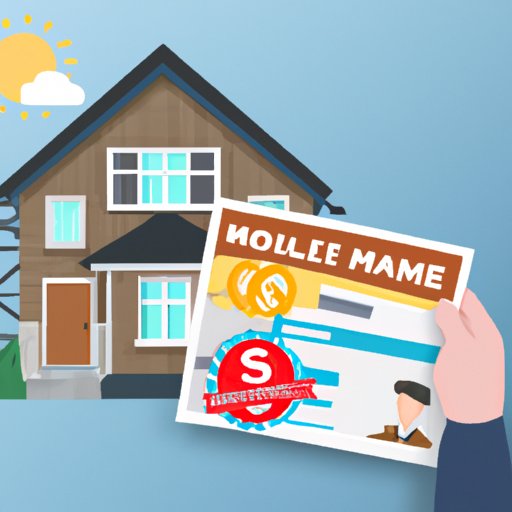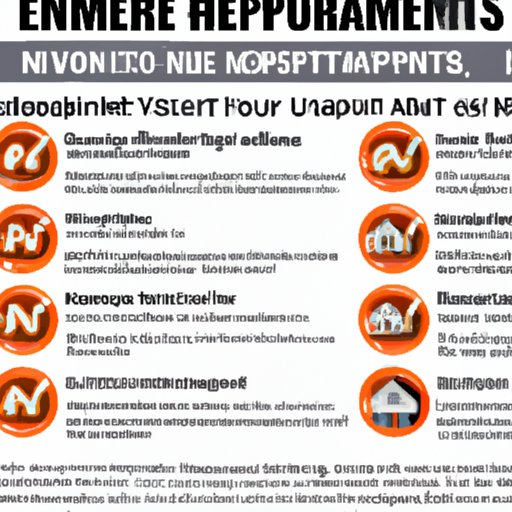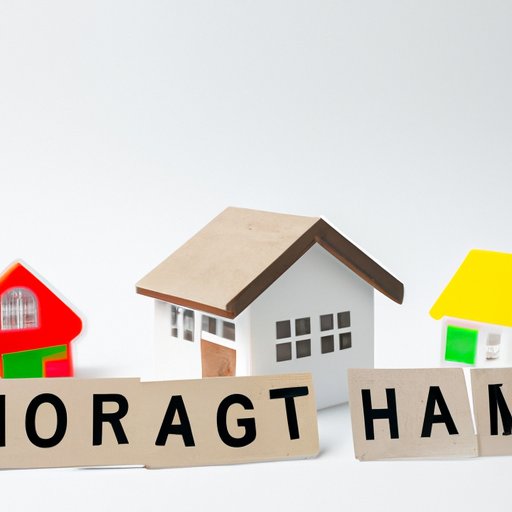Introduction
Buying a home is a major financial decision with long-term implications. It’s important to understand how much home you can get approved for so you don’t end up in over your head financially. Knowing how much home you can afford will help you make informed decisions about what type of mortgage is right for you and how much you should be spending on your new home.
Calculating Your Home-Buying Budget: How Much Can You Get Approved For?
When trying to determine how much home you can get approved for, there are several factors to consider. These include establishing an affordable mortgage payment, understanding your debt-to-income ratio, and calculating your down payment.
Establishing an Affordable Mortgage Payment
The first step in determining how much home you can get approved for is to establish an affordable monthly mortgage payment. According to the Consumer Financial Protection Bureau (CFPB), “Your total monthly debt payments should be no more than 43% of your gross monthly income.” To calculate your maximum monthly mortgage payment, multiply your gross (pre-tax) monthly income by 0.43. This figure is the maximum amount you should spend on housing costs each month, including principal, interest, taxes, and insurance (PITI).
Understanding Your Debt-to-Income Ratio
Your debt-to-income ratio (DTI) is another key factor in determining how much home you can get approved for. The CFPB recommends keeping your total DTI below 36%. Your DTI is calculated by dividing your total monthly debt payments by your gross monthly income. If your DTI is higher than 36%, it may be difficult to get approved for a mortgage loan.
Calculating Your Down Payment
Your down payment is another important consideration when determining how much home you can get approved for. Generally, lenders require a minimum down payment of 3-5% of the purchase price. However, a larger down payment could increase your chances of getting approved for a higher mortgage amount.
What Mortgage Payment Can You Afford? Understanding How Much Home You Can Get Approved For
Once you’ve established a budget and calculated your down payment, it’s time to start looking at loan terms and interest rates. Different types of mortgages have different terms and interest rates, so it’s important to research the options available to you. Additionally, you should consider the total cost of a mortgage, which includes closing costs, property taxes, and other fees associated with homeownership.
Discussing Loan Terms and Interest Rates
When considering how much home you can get approved for, it’s important to discuss loan terms and interest rates with your lender. Different loan types, such as fixed-rate or adjustable-rate mortgages, have different terms and interest rates. Comparing different loan types can help you determine which one is best for you.
Determining the Total Cost of a Mortgage
In addition to the loan terms and interest rate, you should also factor in the total cost of a mortgage. This includes closing costs, which are typically 2-5% of the purchase price of the home, as well as property taxes and other fees associated with homeownership.
Considering Other Costs Associated With Homeownership
It’s also important to consider other costs associated with homeownership, such as homeowner’s insurance, utilities, and maintenance costs. These costs can vary significantly depending on the age and condition of the home, so it’s important to factor them into your budget when determining how much home you can get approved for.

Tips for Maximizing the Amount of Home You Can Get Approved For
There are several steps you can take to maximize the amount of home you can get approved for. These include increasing your credit score, making a larger down payment, and finding a co-signer.
Increasing Your Credit Score
Your credit score is one of the most important factors in determining how much home you can get approved for. A higher credit score can result in lower interest rates and better loan terms. Therefore, it’s important to work on improving your credit score before applying for a mortgage.
Making a Larger Down Payment
Making a larger down payment can help you get approved for a higher mortgage amount. A larger down payment reduces the amount of money you need to borrow, which can help you get better loan terms and a lower interest rate.
Finding a Co-Signer
If you don’t have the necessary credit score or down payment to get approved for a higher mortgage amount, you may want to consider finding a co-signer. A co-signer with good credit can help you get approved for a higher mortgage amount and better loan terms.

The Factors That Determine How Much Home You Can Get Approved For
When trying to determine how much home you can get approved for, there are several factors to consider. These include income, credit score, debt-to-income ratio, and loan terms. Each of these factors plays an important role in determining how much home you can get approved for.
Income
Your income is a key factor in determining how much home you can get approved for. Most lenders require borrowers to have a steady source of income and the ability to repay their mortgage. The higher your income, the more likely you are to get approved for a higher mortgage amount.
Credit Score
Your credit score is another important factor in determining how much home you can get approved for. A higher credit score can result in lower interest rates and better loan terms, which can help you get approved for a higher mortgage amount.
Debt-to-Income Ratio
Your debt-to-income ratio (DTI) is also a key factor in determining how much home you can get approved for. Most lenders prefer a DTI below 36%. If your DTI is higher than 36%, it may be difficult to get approved for a mortgage loan.
Loan Terms
Different types of mortgages have different terms and interest rates. Comparing different loan types can help you determine which one is best for you and how much home you can get approved for.
How to Increase Your Chances of Getting Approved for a Higher Mortgage Amount
If you’re looking to get approved for a higher mortgage amount, there are several steps you can take. These include improving your credit score, reducing your debt, and increasing your income.
Improving Your Credit Score
Improving your credit score is one of the best ways to increase your chances of getting approved for a higher mortgage amount. Paying off debt and making on-time payments can help improve your credit score and make it easier to get approved for a higher mortgage amount.
Reducing Your Debt
Reducing your debt is another way to increase your chances of getting approved for a higher mortgage amount. Paying off existing debt and limiting new debt can help reduce your debt-to-income ratio (DTI) and make it easier to get approved for a higher mortgage amount.
Increasing Your Income
Increasing your income is another way to increase your chances of getting approved for a higher mortgage amount. A higher income can help you qualify for a higher mortgage amount and better loan terms.
Are You Ready to Buy a Home? What to Consider When Deciding How Much You Can Get Approved For
Before applying for a mortgage, it’s important to assess your financial situation and make sure you’re ready to buy a home. You should also prepare for unexpected costs and research different types of mortgages to determine which one is best for you.
Assessing Your Financial Situation
Before applying for a mortgage, it’s important to assess your financial situation and make sure you’re ready to buy a home. This includes understanding your budget, establishing a realistic down payment, and researching different types of mortgages.
Preparing for Unexpected Costs
It’s also important to prepare for unexpected costs associated with homeownership, such as repairs and maintenance. These costs can add up quickly, so it’s important to factor them into your budget when determining how much home you can get approved for.
Researching Different Types of Mortgages
Finally, it’s important to research different types of mortgages to determine which one is best for you. Different types of mortgages have different terms and interest rates, so it’s important to compare the options available to you before applying for a mortgage.
Questions to Ask Yourself Before Applying for a Mortgage: How Much Home Can I Get Approved For?
Before applying for a mortgage, it’s important to ask yourself some questions. These include: Does my current financial situation make buying a home a good idea right now? What mortgage payment can I realistically afford? How much of a down payment can I make? What are the terms of the loan I’m considering? Answering these questions can help you determine how much home you can get approved for.
Conclusion
Buying a home is a significant investment. It’s important to understand the factors that determine how much home you can get approved for, such as income, credit score, debt-to-income ratio, and loan terms. Additionally, there are several steps you can take to maximize the amount of home you can get approved for, such as increasing your credit score, making a larger down payment, and finding a co-signer. Finally, it’s important to assess your financial situation and prepare for unexpected costs before applying for a mortgage.
(Note: Is this article not meeting your expectations? Do you have knowledge or insights to share? Unlock new opportunities and expand your reach by joining our authors team. Click Registration to join us and share your expertise with our readers.)
